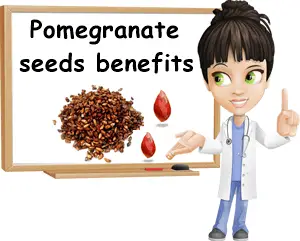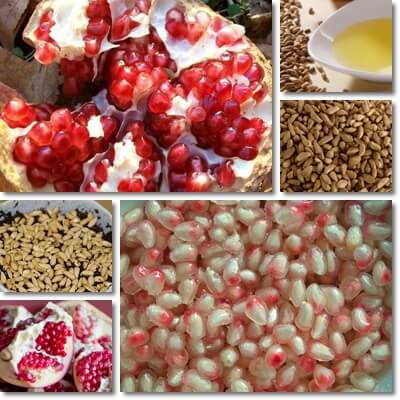What are pomegranate seeds? Pomegranate seeds refers to both the edible fruit pulp and the seeds of the pomegranate fruit. There’s a bit of a confusion since the edible fruit pulp is organized in the form of dozens of separate, ruby-colored seed-like pieces each containing an actual seed. Usually, when someone says ‘pomegranate seeds’, they are talking about the edible, colorful fruit pulp that is shaped like seeds. However, the terms may also be used to refer to the actual seeds because, well, they are seeds. Today we are going to talk about the actual seeds of the pomegranate fruit and their nutritional properties, health benefits, side effects and various uses and contraindications.
What do pomegranate fruits and seeds look like? A whole pomegranate fruit is usually larger than an orange, but smaller than a grapefruit. It is made up of a hard, inedible rind containing a white, spongy pith or albedo (an inner layer of the rind). There is a good amount of pith or albedo in pomegranate fruits and it contains the edible fruit pulp and seeds. The edible fruit pulp occurs in the form of separate pieces of plump, juicy, usually pink or ruby-colored, translucent pulp shaped like seeds (and called arils) and containing one seed each.

The number of seeds in a pomegranate ranges from a couple of hundreds to over a thousand. The hard seeds are tiny and cream-colored. They are elongated and relatively slender, often more rounder at one end and pointier at the other. As they dry out, they may turn brown or dark purple red if they still have some pulp left on them (the darker color is a result of the anthocyanins-rich pulp oxidizing). In addition to being edible, the actual seeds of the fruit hold therapeutic potential and can be used for various health purposes.
Pomegranate seeds uses
The seeds can be eaten along with the juicy pulp surrounding them (the arils). They are also dried and grounded to make a pomegranate seed extract that is used as a food supplement, seasoning or in cosmetic products. But the most popular use is pressing the seeds to obtain pomegranate seed oil. Ideally, the seeds are cleaned of pulp, dried and cold pressed to obtain an unrefined carrier oil with varied external uses, primarily skin, scalp and hair care. There are also studies investigating the oil for its anticancer, antidiarrheal and antibacterial properties as well as benefits for diabetes, weight control and cardiovascular health.
Pomegranate seeds: to eat or not?
Technically, you can eat pomegranate seeds, both the juicy, ruby-colored pulp (the arils) and the actual seeds. But while you can eat all the juicy, sweet and tangy pulp you want without side effects, it might be best to not eat too many of the hard seeds at once.
Some of the side effects of eating too many pomegranate seeds include:
1) The seeds are an extremely rich source of fiber and can lead to digestive discomfort or loose stools.
2) There is a very small risk of intestinal blockage if you eat too many of the seeds or don’t chew them well.
3) If you eat too many of the hard seeds at once, you might also experience small tears or bleeding when you have a bowel movement and if you have hemorrhoids. Learn more about what Foods to Eat and to Avoid for Hemorrhoids.
4) Trying to chew on the seeds can sometimes result in injuries to the gums and bleeding.
5) Low allergenic potential. It is possible eating pomegranate seeds or pulp or using the seed oil topically or undiluted causes allergic reactions, especially in those with multiple pollen or food allergies.
6) Avoid feeding the seeds to toddlers and children because there is a chance they may go down the wrong pipe and be aspirated into the lungs. Read more about Food Aspiration in Lungs: Causes, Symptoms and Treatment.

So while it’s perfectly safe to eat the actual pomegranate seeds, it’s also best to keep to a limited intake. After all, you get overall little nutrition from the hard seeds as they don’t really get digested but come out pretty much as they came in, especially if you don’t chew them at all. The real nutrition is in the arils – the juicy and glossy, bright pink and ruby-red pulp encompassing the hard seeds. Find out more about the Properties and Benefits of Pomegranate (the red, juicy pulp, that is).
Pomegranate seeds nutrition facts
1) Rich in natural oils. Pomegranate seeds oil content varies between 4.4% and 18%, depending on the variety of pomegranate, maturation of seeds, specifics of extraction process and other factors. Of total lipid content, pomegranate seeds are highest in the polyunsaturated punicic acid, between 65.3% and 85%. The rest of the oil profile of the seeds is represented by under 10% palmitic acid (saturated fat), stearic acid (saturated fat), oleic acid (monounsaturated fat) and linoleic acid (polyunsaturated fat).
2) Source of antioxidants. In addition to the polyunsaturated punicic acid and linoleic acid and mononunsaturated oleic acid, pomegranate seeds contain flavonoids, beta-carotene and small amounts of chlorophyll, all compounds with strong antioxidant properties. The yellow color of the unrefined, cold-pressed pomegranate seed oil is testimony of the presence of pigmented antioxidants. The antioxidants also prevent oxidation of the oils and its healthy polyunsaturated fatty acids. The antioxidant activity of the seed oil is comparable to that of green tea.
3) Pomegranate seeds and vitamin E. Studies have shown that both whole pomegranate seeds and the oil obtained from them are good sources of the antioxidant vitamin E. Vitamin E content of the oil ranges from 135 to 525 mg per 100 g of oil and is best represented by the form gama-tocopherol (study: Fatty acid, vitamin E and sterols composition of seed oils from nine different pomegranate (Punica granatum L.) cultivars grown in Spain). The relatively high amounts of the vitamin in the oil support its use for scalp, hair and skin care.
4) Contains phytosterols. Pomegranate seeds and seed oil are important sources of phytosterols, plant derived compounds similar in composition to cholesterol, but which compete with cholesterol for absorption in the human body, contributing to improved blood cholesterol profile and possibly lower risk of cardiovascular disease. Beta-sitosterol is found in the highest amounts (around 77.9%), followed by delta five-avenasterol (approximately 7.5%), campesterol (less than 6.5%) and trace amounts of 10 other phytosterols.
5) Source of conjugated linoleic acid. Conjugated linoleic acid is a form of linoleic acid with important antioxidant, anti-inflammatory and anticancer properties. It represents a little over 13% of total fatty acids profile (study: Oil Characterization and Lipids Class Composition of Pomegranate Seeds).
What are the potential health benefits of pomegranate seeds?
Research on the nutritional properties of the seeds reveals their contribution to the following health effects:
1) Pomegranate seeds oil is good for skin, scalp and hair. It smooths the hair cuticle and gives shine, moisturizes and nourishes skin, has an anti-aging action and anti-inflammatory properties for the scalp. It is commonly employed for topical use only, frequently also diluted with a carrier oil such as olive oil.
2) Potentially helpful for arthritis pain. The seeds, seeds extract and oil hold great anti-inflammatory potential and can help with arthritis pain.
3) May help reduce hot flashes. The seeds and oil made from them have low estrogenic action and have been shown to help with hot flashes.
4) Cholesterol-lowering effects. The seed extract and oil have been show to help lower blood cholesterol levels in individuals with high blood cholesterol. The effects are attributed to punicic acid.
5) Good for non-infectious diarrhea. While chewing on too many seeds can lead to loose stools, it has been shown that taking pomegranate seed extract and preparations stops non-infectious diarrhea naturally and effectively. In vitro studies show the seed extract to also have antimicrobial and antiplasmodial activity, being considered as an alternative future treatment for infectious diarrhea.
Find out more about What to Eat When You Have Diarrhea.
6) Boasts hepatoprotective effects. There is research that shows pomegranate seeds extract exhibits a protective effect on the liver.
7) Anti-diabetic properties. Animal studies show the seed extract to lower blood glucose levels, suggesting potential benefits for diabetes prevention, management and treatment. However, the results cannot be applied to humans as further research is needed.
8) Anti-inflammatory and anticancer activity. The antioxidants and anticancer agents in pomegranate juice, seed oil and peel have been found to reduce the proliferation of tumor cells, the formation of new blood vessels that support tumor growth, induce apoptosis (programmed cell death in cancer cells) and overall hold potential for the prevention of various cancers and chronic inflammatory conditions. Also see Properties and Benefits of Pomegranate Seed Oil.
How to process pomegranate seed arils?
If you’re referring to the pulpy ‘seeds’, then you can make a deliciously refreshing and nutritious pomegranate juice, filled with highly bioavailable vitamins and dietary minerals. Just remember to drink the juice as soon as you make it because its vitamin C is highly unstable and will deteriorate the longer you keep the juice. What I like to do is chill the whole fruit for several hours or overnight in the refrigerator and then make the juice so I can enjoy it slightly chilled right away.
What to do with pomegranate seeds?
If you’re referring to the actual, hard seeds, then you can depulp and ground them to make a seasoning powder or supplement. Just remember to talk to your doctor first if you are considering using the pomegranate seed powder for any ailments or existing conditions or if you are receiving treatment for a medical condition. If you have access to a cold press, then you can make pomegranate seed oil for external use that is guaranteed to be unrefined, unprocessed and wholly natural.
Alternatively, you can germinate the seeds and grow your own pomegranate tree. The seeds work best if germinated onto a moist paper towel in an enclosed plastic container or glass jar and offered plentiful sunlight. Planting should be considered only after the seedling is strong enough to withstand outside temperatures and conditions.
